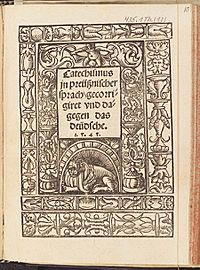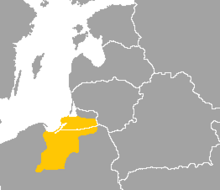Old Prussian language facts for kids
Quick facts for kids Prussian |
|
|---|---|
 |
|
| Region | Prussia (region) |
| Extinct | Early 18th centurye18 |
| Language family |
Indo-European
|
| Linguasphere | 54-AAC-a |
 |
|
Old Prussian was a special language spoken long ago. It belonged to the Baltic languages family. People called the Old Prussians spoke it. They lived in a region known as Prussia.
This area is now part of north-eastern Poland and the Kaliningrad Oblast in Russia. The language is called "Old Prussian" to show it's different from later languages spoken there. Sadly, Old Prussian disappeared in the early 18th century. Some people are trying to bring it back, but it's a big challenge.
Contents
What Was Old Prussian?
Old Prussian was a language from the Baltic group. This group also includes modern languages like Lithuanian and Latvian. However, Old Prussian was quite different from them. It had its own unique sounds and words.
It was spoken by the native people of Prussia. These people were known as the Old Prussians. They lived in the lands along the south-eastern coast of the Baltic Sea.
Where Was It Spoken?
The Old Prussian language was spoken in a historical region called Prussia. This region is now split between two countries. Part of it is in north-eastern Poland. The other part is the Kaliningrad Oblast in Russia.
Imagine a map of Europe. Find the Baltic Sea. The Old Prussians lived right on its southern shore. Their language was a key part of their culture and identity.
When Did Old Prussian Disappear?
Old Prussian slowly faded away over many years. It became extinct in the early 18th century. This means that by the 1700s, no one spoke it as their main language anymore.
Many things led to its disappearance. Wars and changes in the region played a part. Also, more and more people started speaking German. This happened as German speakers moved into the area. Eventually, German replaced Old Prussian entirely.
Efforts to Bring It Back
Even though Old Prussian is extinct, some people are trying to revive it. This means they are working to learn and teach the language again. They study old texts and records to understand how it worked.
These efforts are often led by linguists and cultural enthusiasts. They hope to bring a piece of the Old Prussian heritage back to life. It's a difficult task, but it shows how important languages are to history.
Images for kids
See also
 In Spanish: Idioma prusiano antiguo para niños
In Spanish: Idioma prusiano antiguo para niños
 | Leon Lynch |
 | Milton P. Webster |
 | Ferdinand Smith |


